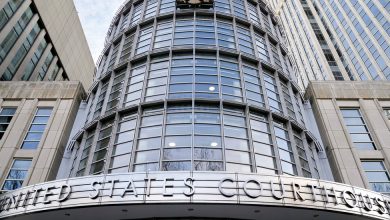
Ron DeSantis Is Not Scott Walker

Scott Walker, left, faded quickly in the primary debates in 2015.Credit…Doug Mills/The New York Times
Ron DeSantis Is Not Scott Walker

By Nate Cohn
Is Ron DeSantis the next Scott Walker? It’s a question I’ve been hearing a lot lately.
The premise is that there’s an important similarity between the two: They both earned the affection of conservatives by “owning the libs” as governors, rather than by giving soaring speeches or otherwise demonstrating the skills to win a presidential nomination.
In the end, Mr. Walker’s success in Wisconsin did not translate to the national stage; the implication is that Mr. DeSantis’s success in Florida might not translate either. A wave of articles over the last few weeks has questioned whether he has the charisma, charm and likability to win the nomination. If he falters, the ending of his campaign might read a like lot the story of Walker for President.
But, at least at the beginning of the race, Mr. DeSantis is no Scott Walker. He would start the campaign in a very different and far stronger position, even if there is still no way to know whether he “has what it takes” to succeed against former President Donald J. Trump.
What sets Mr. DeSantis apart from Mr. Walker? To be blunt: how many people already say they want him to be president.
In this narrow but important respect, Mr. DeSantis has a lot more in common with Barack Obama or Ronald Reagan than Mr. Walker or the other promising first-time candidates who did not live up to high hopes in recent years, like Kamala Harris, Rick Perry or the retired general Wesley Clark.
Overall, Mr. DeSantis has 32 percent support in polls taken since the midterm elections. This is not a fleeting product of a wave of favorable media coverage. Instead, he has made steady gains in the polls over the last two years.
Mr. Walker, in contrast, had 7 percent in the early polls.
Looking back, it’s striking how rare it is for a first-time candidate to hold this level of support. Since 1976, only six candidates who hadn’t previously run for president or vice president have managed to consistently attract more than half of Mr. DeSantis’s support in the early polls: Mr. Obama, Hillary Clinton and Rudy Giuliani in the 2008 cycle; George W. Bush in 2000; Ted Kennedy in 1980; and Mr. Reagan in 1976.
Needless to say, this is an impressive group. It includes three future presidents, a Clinton who won the popular vote, a Kennedy who nearly defeated an incumbent president in the primary, and, well, a pro-choice Republican who nonetheless managed to hold an uninterrupted lead in the 2008 national polls until Iowa.
The way Mr. DeSantis got this strength is relatively impressive as well. Unlike three of the six candidates, he is not the direct relative of a former president. He was not a nonpartisan national hero in the aftermath of the Sept. 11 attacks, like Mr. Giuliani. The two remaining candidates who did not benefit from a family name or exceptional events — Mr. Reagan and Mr. Obama — are arguably the two most impressive political figures of the last half-century.
There’s no need to speculate about whether Mr. DeSantis is the “next” Reagan or Obama. Not even Mr. Obama and Mr. Reagan were clearly Obama or Reagan at this stage. And Mr. Reagan and Mr. Obama differ from Mr. DeSantis in the very same way that he’s purportedly similar to Mr. Walker, as both Mr. Obama and Mr. Reagan rose to prominence by commanding the national stage in famous speeches duringtheir party’s campaigns in 1964 and 2004.
But even if Mr. DeSantis is not a renowned orator, it could be a mistake to assume that his popularity is nothing more than the sum of the political capital accrued from his policy moves. The simplest explanation for his unusual popularity is that Republicans haven’t just liked what he’s done, but also that they’ve liked what they’ve seen and heard of Mr. DeSantis himself. His charisma may not be what won them over, but Republicans probably aren’t under any illusion that he’s as charismatic as Mr. Reagan or Mr. Obama. At this point, Republicans have seen and heard a lot. Many support him anyway.
After all, most modern presidential nominees — Joe Biden, Mrs. Clinton, George W. Bush, Bob Dole, John McCain, John Kerry, Mitt Romney, Al Gore, to name eight recent ones — were not exactly superstar political talents distinguished by soaring oratory, made-for-television charisma, clap-backs on social media or dominant debate performances. What they had was a deep base of mass and elite support. Deprived of that advantage, there’s no reason to think they would have fared any better than those without it, like Mr. Walker or Ms. Harris.
Would Mr. Biden have won the nomination if he had entered the 2020 campaign with as little support as Mr. Walker had in 2016? Not likely. In fact, we know he fell flat in two prior presidential bids that began without the blessing of such support and when he was a more energetic campaigner.
Mr. DeSantis will probably need to be a relatively strong campaigner and debater to survive against made-for-television Mr. Trump. But the burden on him will nonetheless be quite a bit less than it was for Mr. Walker, who needed to impress voters, activists and donors to earn the support and attention that Mr. DeSantis already has in his possession. He has done the hard part already.




